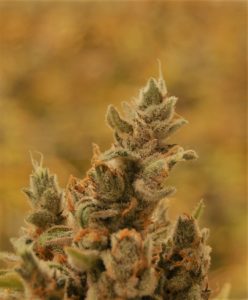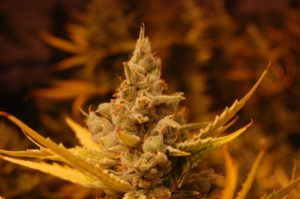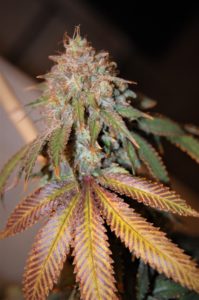by John Garvey

Today we’re talking with John Torkelson, Senior Operations Manager at Point Seven Group, a business solutions and consulting firm in the cannabis space.
John moved to Colorado from Illinois in 2010 after graduating from Columbia College with a degree in Arts Entertainment Media Management. As a cannabis consultant he does a little bit of everything: facility design, seed-to-sale tracking, compliance, extraction, pre-licensing, marijuana-infused products (MIPs) and operations management.
John’s experience in and understanding of the industry makes him a solid resource for those wishing to go into cannabis cultivation, extraction or retail. He’s helped design cannabis facilities in four states and helped dozens of aspiring cannabis industry pros navigate the licensure application process.
My start into the cannabis space was very organic.
“I actually had never seen a real-life, flowering cannabis plant before I moved out here,” John says.
“I didn’t really think I was going to get into the industry and then I came out here and got my [medical marijuana] card and it was like, ‘Holy s***, this is a real industry with young people, movers and shakers. This is really cool.’”
John grew up gardening with his mom and dad and entered the industry as an entry-level trimmer. In time he worked his way up to head R&D Grower for a Denver-based cultivator.
“I was kind of left to my own devices in a 10,000 square foot facility for a while and just got to pop seeds and look at new stuff and that was really fun,” he recalls.
From there he moved into the company’s larger production facility where he lead the implementation of the company’s clone division. They quickly scaled from selling a couple hundred clones a month to selling thousands of clones with A-list genetics at a time.
“There are plants with our genetics all over the state now, which is pretty cool,” he states.

John left that company a couple years ago and moved into cannabis consulting with Point7. The team at Point7 has almost three decades of collective experience in regulated cannabis markets, which is a lot for such a young industry.
Newbies: What you need to know
It’s a topic for a book (actually, a number of books by now), but here are a few key things to be aware of up-front if you want to start a marijuana dispensary, cannabis growing operation or extraction facility:
- Be aware of how competitive the pre-licensure application is, and …
- Be prepared to spend at least $5,000-$10,000 on the application process (sorry)
- Have in-state partners if you aren’t already in-state
- Have a clear exit strategy from day 1
- Have a compliance mindset from day 1
Pre-licensing
“I cannot stress enough that it is getting much more competitive from state to state.”
The competitive nature of the application process requires you to drop 4 – 5 figures just to get a license. People wanting to enter the industry are thirsty for information about legal issues including contracts; application and compliance costs; and how to put together partnerships.
Unless you’re ridiculously driven, detail-oriented, experienced and naturally competent across all these dimensions, you need someone on your team with considerable industry experience or an outside consultant. No point in giving yourself an arrhythmia.
Compliance
 “99 percent compliance is not compliant.”
“99 percent compliance is not compliant.”
“Compliance is no longer a grey area at all,” warns John. “These regulators and these inspectors, you have to be compliant. And having a good software partner that understands regulatory compliance at a state level and a municipal level is really, really important.”
Quality software with industry-specific features will keep the dogs at bay by helping you maintain clear records and channels of communication across your company. Do it.
Partnerships
Some states are responding to the industry’s rapid growth and consolidation by creating residency requirements. Missouri, for instance, will require 51 percent in-state ownership for cannabis operators. (Amendment 2 in Missouri, which would legalize medical cannabis, is likely to pass in November.) Other states have more stringent requirements. It’s generally a good idea to have local partnerships in most industries, although residency requirements make that all the more important in cannabis.
That said, regulators in newly legal states view a history of compliance in other states favorably. Consider an out-of-state partner or experienced consultancy if you’re pursuing a license in a newly-legal state.
Book a consultative call with John
Exit strategy
We’ve noted in previous blogs that the cannabis industry is experiencing rapid consolidation, making exit strategy an important topic of discussion tied to compliance.
“Big Pharma companies, Big Ag companies that are used to running compliant and heavily-regulated businesses—they want that same level of confidence in the groups they’re buying out,” John says.
“If you have the state inspectors knocking on your door every other week because you can’t get your inventory put together at your dispensary, at your cultivation facility, that doesn’t look good to a potential buyer. If you have those dings on your record as an operator, that’s something people absolutely look at when they’re talking about investing in a company.”

As the price of flower continues to drop, how do you keep your product from becoming commoditized?
“As the margins drop and as more people are able to grow lots of cannabis I think we’re going to see a split between craft cannabis vs. the Anheuser Busch or Coors model, as we’ve seen in the alcohol realm. It’s the difference between Black Shirt Brewing in Denver or Renegade vs. Coors over in Golden.
“You’re never going to be able to keep up with their production but at the end of the day if you want whatever the hippest new flavor is, the big players aren’t going to have that. They’re going to have Blue Dream, they’re going to have Sour Diesel. The stuff that works and does what it’s supposed to do but that is one way to differentiate yourself is to have the new hot flower and stuff that only you have in the market.”
In a nutshell, good genetics, proprietary genetics, and generally growing high-quality cannabis are keys to keep your brand from becoming commoditized.
Green Ops: Energy resource management
A common point of discussion, both with regard to operating expenses and environmental impact, is the huge amount of energy it takes to grow cannabis indoors. What steps is the industry taking to reduce these financial and environmental costs?
“I think LED technology has really there in the past 18 months, at least for the [vegetative] side of things. I think that LEDs can absolutely do what you need in veg and they pull a lot less power.
Whoever comes up with the first really killer vegetative LED light is going to be a rich person in this industry.
John’s recommendation? Get a relationship going with LED companies and energy companies to identify rebate opportunities and other ways to save.
Opioids
“As far as public policy, I think that what is exciting for me and what I’m seeing more and more talk of medical marijuana decreasing opioid addiction and overdoses.
“And as someone who unfortunately has lost two very good friends to opiate overdoses, it’s very encouraging to see that in these regulated states that have [legal cannabis] programs … we are seeing a decline in the amount of fatal opioid overdoses when medical marijuana is available. So that’s really exciting.”
It’s a fact: States with legal medical cannabis markets have lower rates of opioid use.
Innovation
Getting cannabis into a water-soluble state—an aspiration among some chemists in the industry—will increase bioavailability and allow for more precise dosing. It could also make for a very interesting cup of coffee.
“I was just talking with someone that’s working on figuring out a way to get cannabis into a water-soluble state. When that happens it’s going to open up all kinds of different avenues to creating new products because cannabinoids aren’t water-soluble they’re fat-soluble. Figuring out how to get it so that it doesn’t separate out in a drink is really kind of the next step.
“There’s a lot of cool technology that’s happening around product development right now that’s gonna prove to be really interesting in the coming years.”
Shiny objects
“We see more and more money and more technology come into the space every day which is really exciting. But if you don’t have someone on your team that understands the cannabis space and has seen this progression over a number of years you can get sold a bunch of snake oil. We’ve seen that happen time and time again with clients that end up buying stuff they really don’t need and then not really using the technology for what it is. It ends up being either a talking point for tours or it just kind of sits there and collects dust.
If you don’t have someone on your team that understands the cannabis space you can get sold a bunch of snake oil.
“We also try to work with our client groups to really spend money on what’s important and not spend money on what’s the newest, coolest thing out there.”
Scaling Extraction Operations
“I don’t think a lot of companies were really expecting to have to make machines so big so quickly. There are a couple companies that are tackling the idea of big machines— hundred liter machines, two-hundred liter machines. But the bigger the machine and the bigger the chamber, the thicker it has to be to contain that pressure.”
Again, every solution presents its own challenges. Ergo, you need a solid team with technical, financial, regulatory and marketing expertise.
“It’s really about efficiency. …
“People are looking to get more efficient wherever they can because as we’re seeing throughout the industry, the price of herb is going down. And so the only way that you can keep your margins is to get more efficient. There gets to a certain point where you can’t grow a pound for any cheaper.
“I don’t think we’re there yet … but when you take into account that people have to get paid and overhead is expensive and labor is expensive, whenever you can get a machine to do something for you in an automated way I think people are excited about that. But it comes at a price.”
The Future is Clear: The Future is Hazy.
… Er, you know what I mean
In time, the cannabis industry is going to become much like any other industry. Like it or not, Big Ag, Big Pharma, and other large industry efficiencies are entering the cannabis industry. As trademark protection, financial services and other legal protections are extended to the industry, investment in cannabis will only accelerate.
Cannabis Enterprise Business Solutions
Talk to one of our reps to learn how our industry-leading point of sale and inventory management solutions can keep the boogie man away from your dispensary.



